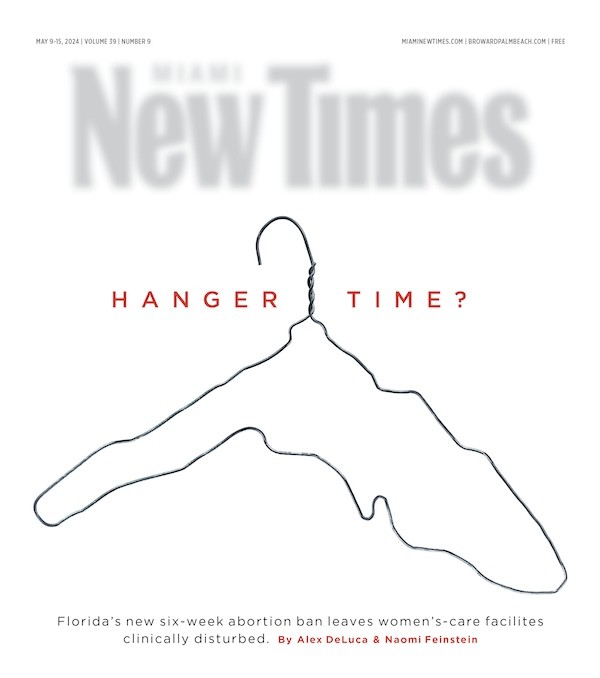On Friday, a Miramar drug dealer was sentenced to ten years in prison for importing fentanyl, a powerful surgical painkiller that is sometimes cut into batches of heroin. The drug, which the dealer in question had imported from China, has been tied to scores of deaths in "heroin-heavy" cities like Detroit, Boston, and Newark as well as cities like West Palm Beach.
What was frightening about Friday's sentencing, however, was a detail that the dealer was not prosecuted for: According to the Sun Sentinel, the man was also carrying W-18, a staggeringly strong but not-yet-illegal synthetic opiate, rumored to be "100 times more powerful than fentanyl."
Jim Hall, South Florida's leading synthetic drug expert, says W-18's existence had been "something like gossip" for the past few months — but now that law enforcement officials say the drug has reached South Florida, it may be time to brace for a wave of new synthetic opiates flooding the streets. These synthetics are drugs invented by rogue chemists. By swapping out a few molecules, the chemists create "analogs" — new drugs, similar to known ones, that also offer highs or pain relief but, because of the differing chemical structure, are not technically illegal.
Adolphe Joseph reportedly had 2.5 pounds of W-18 in his home when he was arrested. It was unclear where the drugs had come from. The drug had typically been seen only in Canada up until this point. According to a February Vice article, W-18 typically comes in powder form but had been pressed into fake OxyContin tablets and sold as pills. Law enforcement officials in Canada suspected the drug had been imported from "clandestine Chinese labs."
The fact that the drugs made it all the way down to Florida, Hall says, shows that the area's opiate problem seems to be escalating, mirroring trends nationwide. Data from the Broward Sheriff's Office, he says, "informally confirms that fentanyl is a big-deal problem now. Fentanyl is definitely the hot issue of 2016." In Miami-Dade County, he says, fentanyl deaths quadrupled between 2014 and 2015.
"These things are killers," he says. "They're used as a booster in low-potency heroin to make them more competitive in sales." Last month, law enforcement officials said 11 people had died of heroin overdoses this year in West Palm Beach alone.
Law enforcement officials have been tracking fentanyl analogs for several years. But W-18, he says, is something a bit more dangerous: Just one strain in a sea of new synthetic opiates that dealers are now importing from China, largely via FedEx. "What's really new here," Hall says, "is that we've stopped calling them 'fentanyl analogs' and started calling them 'synthetic opiates' in the last ten days."
"There's a W-1 up to a W-32," he says. "W-18 is probably the most potent strain." He adds: "One description I read of it, the analogy compared it to baking chocolate-chip cookies," he says. "One cookie might have six chips, one might have eight, one might have 12. Just a tiny difference can be the difference between life or death."
Though Hall stressed that this was likely an isolated case of W-18, he says it's often hard to tell just what is killing heroin users sometimes. "Often, if the analog is mixed with heroin, heroin just becomes the cause of death," he says.
"What we haven't known is whether the drugs were being imported from Mexico already cut with the analogs or if it was being cut here," he adds. "The fact that this guy seemed to be buying the W-18 on its own shows it's probably being cut here."
[
{
"name": "GPT - Billboard - Slot Inline - Content - Labeled - No Desktop",
"component": "16971022",
"insertPoint": "2",
"requiredCountToDisplay": "2"
},{
"name": "Editor Picks",
"component": "15769925",
"insertPoint": "4",
"requiredCountToDisplay": "1"
},{
"name": "Inline Links",
"component": "16575154",
"insertPoint": "8th",
"startingPoint": 8,
"requiredCountToDisplay": "7",
"maxInsertions": 25
},{
"name": "GPT - Rectangle 2x - Slot Auto-select - Labeled",
"component": "15782206",
"insertPoint": "8th",
"startingPoint": 8,
"requiredCountToDisplay": "7",
"maxInsertions": 25
},{
"name": "Inline Links",
"component": "16575154",
"insertPoint": "8th",
"startingPoint": 12,
"requiredCountToDisplay": "11",
"maxInsertions": 25
},{
"name": "GPT - Leaderboard to Tower - Slot Auto-select - Labeled",
"component": "15782207",
"insertPoint": "8th",
"startingPoint": 12,
"requiredCountToDisplay": "11",
"maxInsertions": 25
}
]











